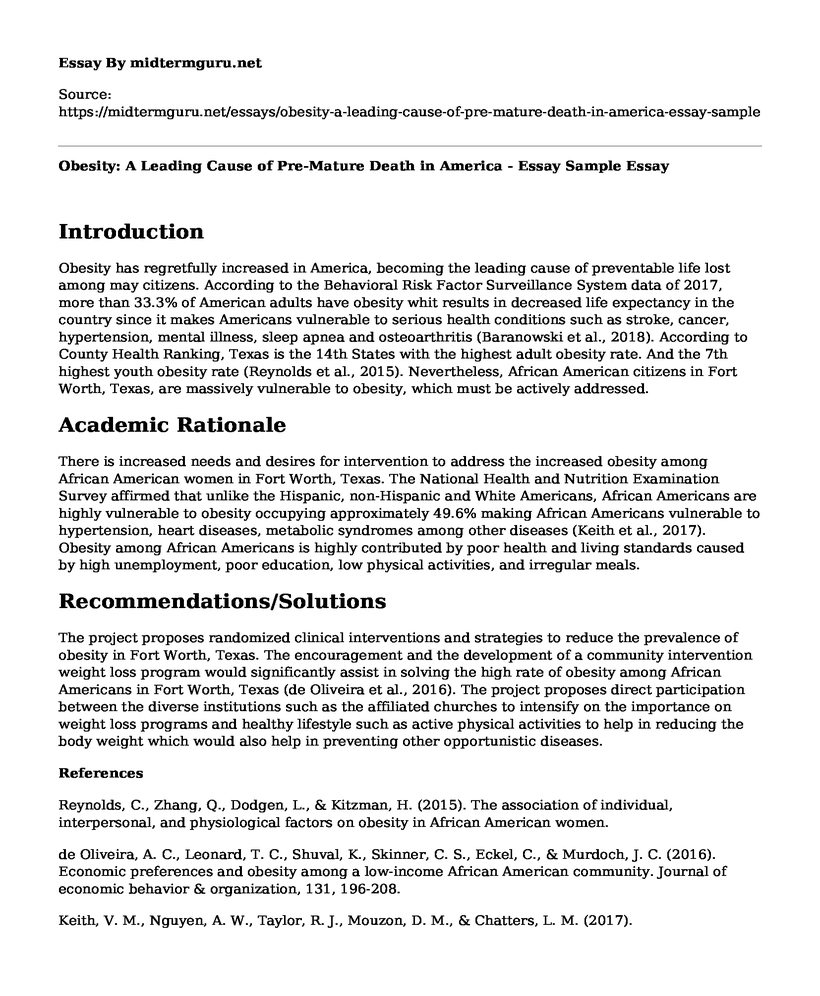Introduction
Obesity has regretfully increased in America, becoming the leading cause of preventable life lost among may citizens. According to the Behavioral Risk Factor Surveillance System data of 2017, more than 33.3% of American adults have obesity whit results in decreased life expectancy in the country since it makes Americans vulnerable to serious health conditions such as stroke, cancer, hypertension, mental illness, sleep apnea and osteoarthritis (Baranowski et al., 2018). According to County Health Ranking, Texas is the 14th States with the highest adult obesity rate. And the 7th highest youth obesity rate (Reynolds et al., 2015). Nevertheless, African American citizens in Fort Worth, Texas, are massively vulnerable to obesity, which must be actively addressed.
Academic Rationale
There is increased needs and desires for intervention to address the increased obesity among African American women in Fort Worth, Texas. The National Health and Nutrition Examination Survey affirmed that unlike the Hispanic, non-Hispanic and White Americans, African Americans are highly vulnerable to obesity occupying approximately 49.6% making African Americans vulnerable to hypertension, heart diseases, metabolic syndromes among other diseases (Keith et al., 2017). Obesity among African Americans is highly contributed by poor health and living standards caused by high unemployment, poor education, low physical activities, and irregular meals.
Recommendations/Solutions
The project proposes randomized clinical interventions and strategies to reduce the prevalence of obesity in Fort Worth, Texas. The encouragement and the development of a community intervention weight loss program would significantly assist in solving the high rate of obesity among African Americans in Fort Worth, Texas (de Oliveira et al., 2016). The project proposes direct participation between the diverse institutions such as the affiliated churches to intensify on the importance on weight loss programs and healthy lifestyle such as active physical activities to help in reducing the body weight which would also help in preventing other opportunistic diseases.
References
Reynolds, C., Zhang, Q., Dodgen, L., & Kitzman, H. (2015). The association of individual, interpersonal, and physiological factors on obesity in African American women.
de Oliveira, A. C., Leonard, T. C., Shuval, K., Skinner, C. S., Eckel, C., & Murdoch, J. C. (2016). Economic preferences and obesity among a low-income African American community. Journal of economic behavior & organization, 131, 196-208.
Keith, V. M., Nguyen, A. W., Taylor, R. J., Mouzon, D. M., & Chatters, L. M. (2017). Microaggressions, discrimination, and phenotype among African Americans: A latent class analysis of the impact of skin tone and BMI. Sociological Inquiry, 87(2), 233-255. https://doi.org/10.1111/soin.12168
Baranowski, B. J., Hayward, G. C., Fajardo, V. A., & MacPherson, R. E. (2018). Increased Prevalence of Obesity/Type 2 Diabetes and Lower Levels of Lithium in Rural Texas Counties May Explain Greater Alzheimer's Disease Risk. Journal of Alzheimer's Disease, 64(1), 303-308. doi.10.3233/JAD-171150
Cite this page
Obesity: A Leading Cause of Pre-Mature Death in America - Essay Sample. (2023, Feb 07). Retrieved from https://midtermguru.com/essays/obesity-a-leading-cause-of-pre-mature-death-in-america-essay-sample
If you are the original author of this essay and no longer wish to have it published on the midtermguru.com website, please click below to request its removal:
- Description of Risk Factors of Adult and Children Obesity
- Paper Example on Nursing: Servant Leadership Model
- Paper Example on DNA Repair as a Critical Tumor Suppressor Function
- Paper Example on Change in Women Roles and Notions of Divorce From the 1950S to the Present
- Future of Nursing: Leading Change, Improving Health Care Delivery - Research Paper
- 2020 Cardiovascular Disease Stats: US Death Rates Remain High - Essay Sample
- Effects of Culture, Sexism and Stress on Maternal Experience - Paper Example







